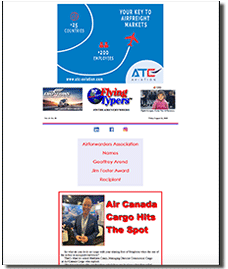

#INTHEAIREVERYWHERE
 |
 #INTHEAIREVERYWHERE |
|
| Vol. 24 No. 38 | Monday September 1,
2025 |
|
| |
Deminimis Saga—A Gas |
I think these verses sounds as a wakeup call for us, and it also shows that even English pronunciations change over time, as everything else. Speaking of changing times, this is a time that shows historical alliances tremble and uncertain new liaisons come to light, drawing a different picture in the mores of international trade. We listen with growing anxiety to the news of a world that has decided to unravel with a bewildering conduct and many of us feel abandoned or betrayed, others simply consider it normal that things change so much in a relatively short time and some simply did not take heed of the changes, finding themselves completely unsettled. Everyone seem to be thinking that President Trump has created this disconcerting landscape, but perhaps the pattern was not so established as most of us were thinking and Trump merely catalysed the reaction. As a ship that comes out of the fog, blurred and squidgy . . . the colours of these changes are not clear and nobody knows whether this boat of change is friendly or hostile, her enormous figure covers the horizon and we wonder . . .
We first quote Turgut Erkeskin, President of FIATA, in his local, Turkish capacity, as he submitted his views from Istanbul, this time not as the voice of FIATA, but as a buoyant appraisal from a Turkish perspective: “The elimination of the deminimis rule is a disruptive change for global air cargo, but it also realigns the industry toward value-driven models. For Türkiye, this presents an opportunity to move beyond transit reliance in air freight supply chains and emerge as a strategic logistics hub for nearshoring, e-commerce fulfilment, and multimodal trade flows.
Nicolette van der Jagt, Director General of CLECAT, offered her comments: “from an EU/CLECAT perspective. Recent analysis of the U.S. decision to end the $800 de minimis exemption and impose new reciprocal tariffs illustrates the profound disruption now being felt across the air cargo sector. The immediate effect has been a sharp decline in transpacific air volumes, as low-value e-commerce shipments once flown individually are increasingly consolidated into sea freight. Industry estimates suggest that volumes on certain China–U.S. lanes have dropped by up to 60%, with e-commerce bookings falling by half in May alone. While this shift is most visible in the U.S. market, it is reshaping global network planning and could undermine connectivity for European exporters, as carriers redeploy freighter capacity to more predictable markets.
Through our friend Paul we also received an official comment from Brad Leonard, Manager Border and Biosecurity, IFCBAA: “Australia Post today announced it will temporarily partially suspend postal sending to the United States (U.S.) and Puerto Rico, effective 26 August 2025, until further notice. The temporary suspension will impact Business Contract, MyPost Business and Retail customers sending goods through the postal network. Gifts under USD$100, letters and documents are unaffected by this change. This response is in-line with action taken by numerous other postal operators globally. The suspension comes as the result from Executive Order “Suspending Duty-Free De Minimis Treatment for All Countries”, requiring that duty on international mail shipments be paid by the international mail carrier or a qualified party acting in lieu of the carrier. This is yet another direct consequence of the Trump administration which has already included the imposition of “reciprocal tariffs” on all goods imported into the U.S. at different levels depending on the country from which they were exported and the imposition of “sectoral tariffs” on certain other goods such as steel and aluminium with more sectoral tariffs on the way. From 29 August 2025 the U.S. will also remove the “de minimis” exemption from customs duty for most shipments valued below a USD$800 threshold (largely effecting the e – commerce sector). The announcement by Australia Post and the other international postal services that they are to cease “de minimis” services affecting most low-value consignments of commercial goods are a predictable consequence that such postal authorities do not want to be involved in this new and uncertain trade world.” So our friends from rather different areas in the world have focused on one essential aspect of the change, the disposal of the USD$800 de minimis rule. Decisions similar to those taken in Australia are ensuing in many other areas. Having worked with the WCO in years when the de minimis rule was discussed, before being introduced long ago, I personally thought the USD$800 limit was absurd then, and is too high even now, imagine what it was in that period. In those years the interests of many emerging operators, not least the big express carriers, were pushing to make eCommerce explode and it did! Retail e-commerce sales surged from approximately USD$27.6 billion in 2000 to over USD$1.2 trillion in the U.S. by 2024, with global retail e-commerce sales expected to exceed USD$6.86 trillion in 2025. Whether this will continue unaffected now is unclear. Anyone who remembers what international trade was before the year 2000 cannot make head or tail of the magnitude of its change. Was it for the greater good? Who knows, it is too late to choose heads or tails now, we are in these straits and for some of us the fog is getting thicker . . . Whether the ship of our trade habits will manage to steer clear of the most dangerous junctions is yet to be seen. For sure a similar complaint was heard by traders across the board: the unpredictability and the contradictions that were registered in the past few months have been considered even more dangerous than the adopted measures. So stop the absurd USD$800 de minimis for good and start adapting. |
If
You Missed Any Of The Previous 3 Issues Of FlyingTypers Access complete issue by clicking on issue icon or Access specific articles by clicking on article title |
||
 Vol. 24 No. 35 Vol. 24 No. 35Misstep Drives Logistics Focus Chuckles for August 12, 2025 Off On The Road To Tomorrow Raising Caine In The JFK Room Beach Summer In The City |
 Vol. 24 No. 36 Air Canada Cargo Hits The Spot In Istanbul FIATA Showed Its True Colors Chuckles for August 22, 2025 Future Is Collaboration Tech & AI AfA Leading the Way Swiss Transport Museum |
|
Publisher-Geoffrey Arend • Managing
Editor-Flossie Arend • Editor Emeritus-Richard Malkin |
Send comments and news to geoffrey@aircargonews.com
|